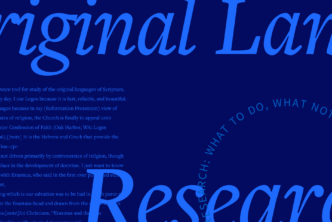I was talking with a friend recently about how I’d been spending a lot of time reading books about the Bible, but less time reading the Bible itself. The spaces between my personal reflections on Scripture were growing wider. I still felt like I was growing and learning, but deep down I knew I was missing something.
Our conversation turned to my parents, who have been incredible, faithful examples of what it means to follow Jesus all my life—but they rarely read the Bible. For my parents, years of task-oriented, check-the-box dedication to Bible study left them with a bitter taste in their mouths. Reading the Bible and memorizing its verses had been impressed upon them so strongly that they could no longer read the Bible without also recalling the negative reinforcement and guilt that often accompanies regimented Bible-reading groups. Both of my parents have preferred to learn and grow by reading someone else’s reflections on Scripture rather than diving into it themselves.
They were spiritually scarred by their perspective of Bible study.
I grew up thinking, “But that’s still no excuse.” Yet, as I found myself encountering similar methodologies for Bible study, I couldn’t help but wonder, “Is this going to wear me out too?” My parents were once just as enthusiastic about Bible study as I was.
The church has more Bible study plans, methods, groups, and techniques than we know what to do with. But here’s the thing: these methods help you create discipline to do something you should want to do. If you don’t see the purpose behind the methods, you’ll burn out. On their own, Bible reading plans and verse memorization techniques are overwhelming—they take time and effort, and can leave you feeling guilty for missing a day, a week, or a meeting.
What’s the point of Bible study plans?
Starting a Bible reading plan is like starting a new diet.
Changing your diet takes discipline. Even if it’s something you really want for yourself, it’s easy to slip up and forget about it. If you let bad habits keep footholds in your life, you’ll fail before you start, and you’ll never create the healthy new habits you want.
The Bible is one of our greatest sources of spiritual food. But sometimes we still fill up on junk food. Blogs, social media, news, TV shows, books, and games. These things aren’t bad in themselves, but when they’re the only sources of perspective, information, and insight you consume, something is missing.
When you have a sodium deficiency, your body craves salty foods. You might not even notice that you’re craving salty foods in particular, but your body is reacting to that deficiency by creating a desire for something that restores it.
Many non-Christians have no desire to read the Bible. They want nothing to do with it. But that doesn’t mean that as God’s creation they don’t, on some level, crave his truth, his wisdom, his love, or his perspective. I see non-Christians all the time who have no idea how closely their innermost desires parallel God’s desires for them.
A Christian, though, is much more likely to notice the source of this spiritual deficiency—we’ve already been exposed to the source of God’s wisdom, truth, and perspective. God’s Word is meant to permeate every aspect of our lives. Our knowledge of him is supposed to transform us into “the aroma of Christ” (2 Corinthians 2:15), but something smells fishy.
The more the spaces grow between my daily readings, the more I find myself saying things like, “That reminds me of a verse in [book of the Bible],” or, “That sounds kind of like the passage where . . .” Before I know it, I’m not just paraphrasing Scripture anymore—I’m making vague references to it, or letting other sources have a greater impact on my understanding of God’s character.
In those moments, losing sight of the value of daily Bible study is more like cutting caffeine from my diet. I’ve never been a coffee drinker, but I have energy drinks all the time because they help me stay alert and focused when I need to be. Caffeine is something I’ve made a part of my regular diet for a purpose—and when I stop having it, I feel it. I don’t have the energy I used to throughout the day. I can’t focus as long. Or, worse, I get headaches.
Without your daily dose of Scripture, it’s tough to be at your best all day.
But reading your Bible isn’t just something you need to do to stay spiritually healthy. It’s not a pill you have to swallow or a chalky vitamin you have to chew. Reading the Bible is something you should do because you want to.
What if I don’t want to read the Bible?
Imagine that your parents wrote a book for you—it’s the history of your family, their marriage, your childhood, how you’ve become the person you are today, and their hopes and dreams for your future. Woven throughout the book is a clear, underlying theme: they love you very much. Maybe, just maybe, you pick up on another theme as well: you haven’t always known what was best for you, and they usually know what they’re talking about.
How do you think they would feel if you told them, “Look, at least I read a chapter today”?
How much you read and how frequently you read is not the point.
Part of my job at Faithlife lets me write reflections on Scripture or dig into biblical topics. To do that well, I need to dig into the Bible daily. But whenever I read the Bible for work, I’m reading with an agenda—I’m hunting for a verse or prowling through a passage. For Scripture to penetrate my heart and permeate my life, I have to read it just to read it, too.
Reading the Bible exposes you to the history of the creator’s relationship to creation—that includes you. If you want to know who God is, he had 40 people write a whole book about him over the course of about 1,500 years. Now all you have to do is pick a Bible up off the shelf, read the Bible online, or download the Bible on your phone.
However you read the Bible, you’re going to get the most out of it if you do it because you want to.
Don’t do it because someone is making you.
Don’t do it to show off how much you read.
Don’t memorize verses to get a cookie, a prize, or acknowledgement.
Those can all be useful motivators to help you get on the right track and create healthy spiritual habits you want to have. But don’t let those be the reasons you read the Bible.
Read the Bible because it excites you.
Read the Bible because you want to know God.
Read the Bible because it’s living and active (Hebrews 4:12).
Read the Bible because it can speak powerful truth into your life right now.
Read the Bible so that your life reveals more of Christ (2 Corinthians 3:3).
Those are reasons to open your Bible every day.
So why bother with Bible reading plans?
I lead a small group of high school freshmen boys. Every two weeks this year we’ve read a chapter of Mark and talked about it together.
Every time we meet, at least half of them say, “I didn’t have time to read it.”
One chapter. Two weeks.
Without discipline, you’ll never read the Bible regularly—no matter how badly you want to.
Daily Bible reading plans, Bible study techniques, and external incentives are all tools designed to help you develop discipline and make Bible study part of your regular routine.
My wife started a diet because she wanted to. At first, she knew that she wouldn’t always be able to resist the unhealthy foods she used to have whenever she felt like. A group of her coworkers started dieting too, and together, they held each other accountable. Sometimes my wife would decline cookies because she knew she would have to tell her coworkers she’d cheated on the diet. But she didn’t start the diet because of her coworkers. She started because she wanted to eat healthier. After eating healthier for a few months, the reasons why she started were enough to keep her going. She didn’t need reminders or accountability.
In the same way, those external factors that help us read the Bible regularly are not the reason why we read. But they are, hopefully, tools we can use until we’ve created healthier habits and made Bible study part of our daily lives. These tools, coupled with meaningful, personal reasons to read the Bible will help you have a far richer spiritual life.
My church recently went through a series called, “Room for Cream.” The premise was that if we want to have room for God in our lives, we couldn’t “fill our cup” until there’s no room for the good stuff. If you don’t have time to read your Bible, what do you need to remove to make time?
The conclusion was profoundly simple:
If you want room for cream in your life, put the cream in first.
If you’re trying to make Bible study a habit, start your day with it. Don’t wait until you’ve filled your day with everything else. Don’t wait until you’re too tired.
You could even read the Bible right now.







